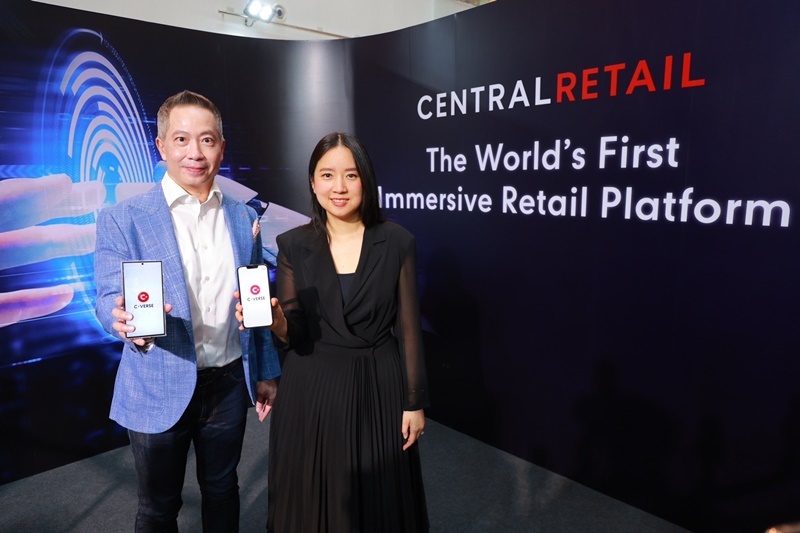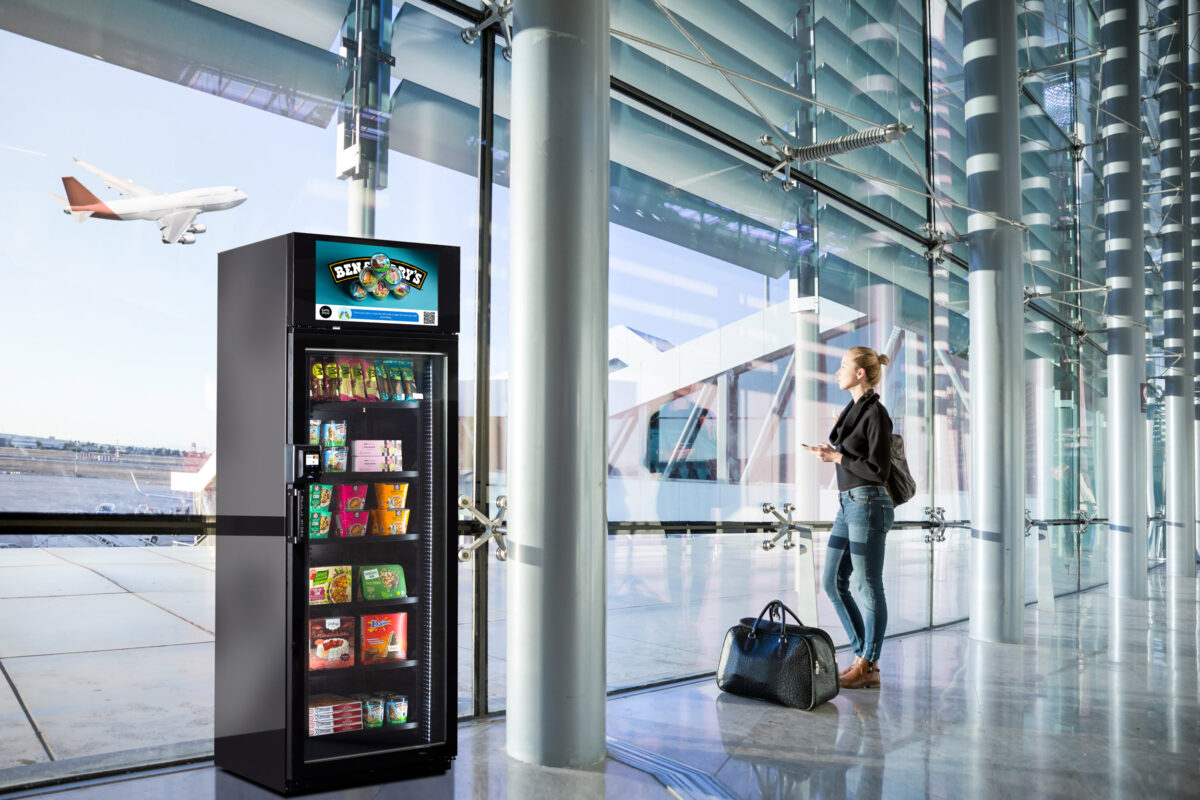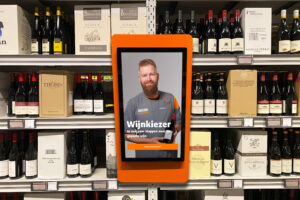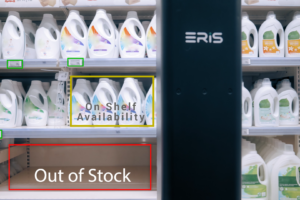The metaverse will expand the Internet – to include virtual worlds that are based on real life and yet open up a whole new spectrum of possibilities. The road to completion still seems long, but experts are advising retailers to start looking at the additional channel now.
According to “manager magazin,” fashion designer Philipp Plein just paid $1.4 million for a Metaverse property. The headline of the editorial article read: “My mother also asked me if I was totally crazy.” Yet all one has to do at the moment is observe the young people who, since the start of the pandemic, can hardly be moved away from their computer screens to sense the potential – and the dangers – of virtual worlds.
Games like Fortnite, Roblox or Minecraft are considered precursors of the metaverse. On the one hand, because users can already move around quite realistically and, on the other, because they can “meet” and interact with their friends or other people in real time on these platforms. What are currently still game characters can in future be avatars that look like you – or like the person you would like to be. Then, just like in real life: Clothes, watches, purses, the right sneakers … make people.
Expression of personality
“In the metaverse, the need for personalization will reach a new peak. While billions of people immerse themselves in the virtual world to play, work or attend concerts together, they want to express their personality,” Stefan Hauswiesner, CEO and co-founder of Graz-based software developer Reactive Reality, is convinced.
Its solution, “Pictofit,” converts images of products and people “at high speed and at an affordable price” into photorealistic 3D models, such as entire fashion collections of brands. One of the company’s latest partnerships, it says, involves Microsoft. Anyone who uses Microsoft Marketplace has access to the technology.

© Kaufland
Diverse opportunities
The opportunities that are opening up for the retail sector are already starting to emerge. Kaufland, for example, has already opened a store in the Nintendo game “Animal Crossing.” “A real novelty in our industry,” says Alisa Götzinger, responsible for corporate communications. She explains: “We reach the respective target groups best in the places where they spend their time. Our youngest customer group is heavily involved in the gaming world. Our store is modeled on a real supermarket, which – this is the message we want to get across – pays attention to sustainability.”
From a company’s point of view, there are a number of things at stake: reaching people and attracting their attention, building and maintaining one’s own image, creating desire for physical products, but also selling virtual products.
“For Generation Z, digital goods and assets already have the same value as physical products,” is the experience of Alexander El-Meligi, CEO and co-founder of the digital agency Demodern, based in Cologne and Hamburg. The technical basis of digital sales are various cryptocurrencies. Possessions are deposited in the metaverse as so-called NFTs, Non-Fungible Tokens. These can be understood more or less like digital property certificates.
App-based online worlds
Online worlds like Decentraland or The Sandbox are already marketing themselves as metaverses. “Many are web- or app-based and thus easily accessible to everyone,” Alexander El-Meligi draws attention.
Adidas is currently establishing a virtual presence at The Sandbox for its Originals division, and explains: “For years, we have been driving the process of digitalization in all areas of the company. So it is only logical to also embrace innovative technologies such as blockchain and metaverse. The metaverse is currently one of the most exciting developments in the digital field. Our goal is to make our brand visible and valuable there.”
Exactly right, say experts. It is still too early to know which investments will be worthwhile in the long term and which platforms will prevail, but learning, researching, preparing, positioning in the competition – all of this is already sensible, they say.
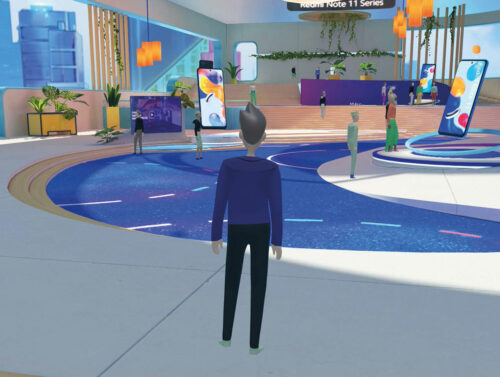
© Xiaomi
Virtual marketing and sales channel
“Since the metaverse will become an important new marketing and sales channel in the long term, all companies should start looking at it,” recommends agency head El-Meligi.
Demodern has already been involved since 2019: “We have developed our own software for the implementation of corporate Metaverse Experiences, which now enables quickly deployable individual solutions for companies. Most recently, we launched a virtual Metaverse showroom for Xiaomi, showcasing the electronics manufacturer’s latest smartphones – to great response.”
El-Meligi says, the metaverse offers the opportunity to “transform an e-commerce solution into a new product and brand experience to reach or tap into new audiences like Gen Z.” Philipp Plein held its first fashion show on its virtual property on March 24. Directly afterwards, Decentraland users were able to buy the presented digital garments as NFTs to dress their avatars with.
Further development of VR and AR
Overall, the metaverse potential is even much more wide-ranging. “The metaverse can also help to better empower employees, optimize processes and transform products,” lists Xenia Giese, Senior Industry Advisor Retail & Consumer Goods at Microsoft Germany. She adds, “The Metaverse enables shared experiences in the physical and digital worlds” – a positive message to brick-and-mortar retail.
Meta Germany also emphasizes how well hybrid systems work and how stationary shopping and the digital experience can be combined. In 2021, Mark Zuckerberg announced his intention to focus on the development of a metaverse with his company Facebook, and the group was renamed Meta Platforms.
Universal platform
A very clear indication of where the journey is headed, even if “the metaverse will not emerge overnight. Many of the products will only be fully realized in the next 10 to 15 years,” predicts Claudia Studtmann, Head of Retail DACH at Meta. She illustrates, “The development of the mobile Internet first helped us write, then talk, and now see each other via video calls. The Metaverse will be the next step where we evolve VR and AR into a universal computing platform.”
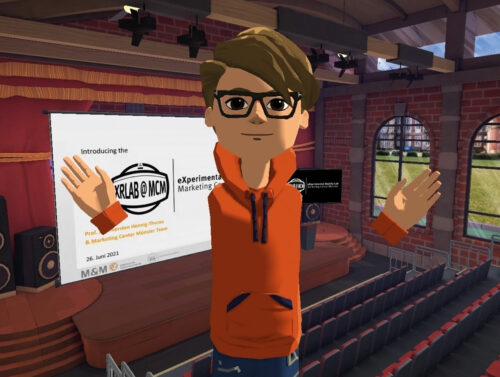
© Henning-Thurau
Already engage
Prof. Dr. Thorsten Hennig-Thurau, Professor of Marketing & Media Research at the University of Münster, is concerned that (brick-and-mortar) retail will miss the timely entry into the metaverse.
What are the particular competitive advantages of metaverse over classic 2D online retail?
For one, even the prettiest website can’t compete with the level of immersion that the Metaverse offers when accessed via modern VR headsets. But the real added value when shopping is the social element – I can do my shopping together with friends instead of having to make my selection alone in front of the computer.
What does this mean for stationary retail?
A powerful additional channel is emerging that will take further sales percentages away from physical stores and city centers. The key questions entrepreneurs must therefore ask themselves: Am I ready to open stores in the metaverse? And: How do I integrate the virtual sales world into my mix of brick-and-mortar and 2D Internet stores?
What do you recommend?
All those who do not want to leave the ground to the competition should, indeed must, get involved now. The example of Amazon should have taught retailers that waiting in markets with network effects is not a good thing and sometimes the beginning of the end.
Author: Stefanie Hütz
Source: stores & shops (EHI)






